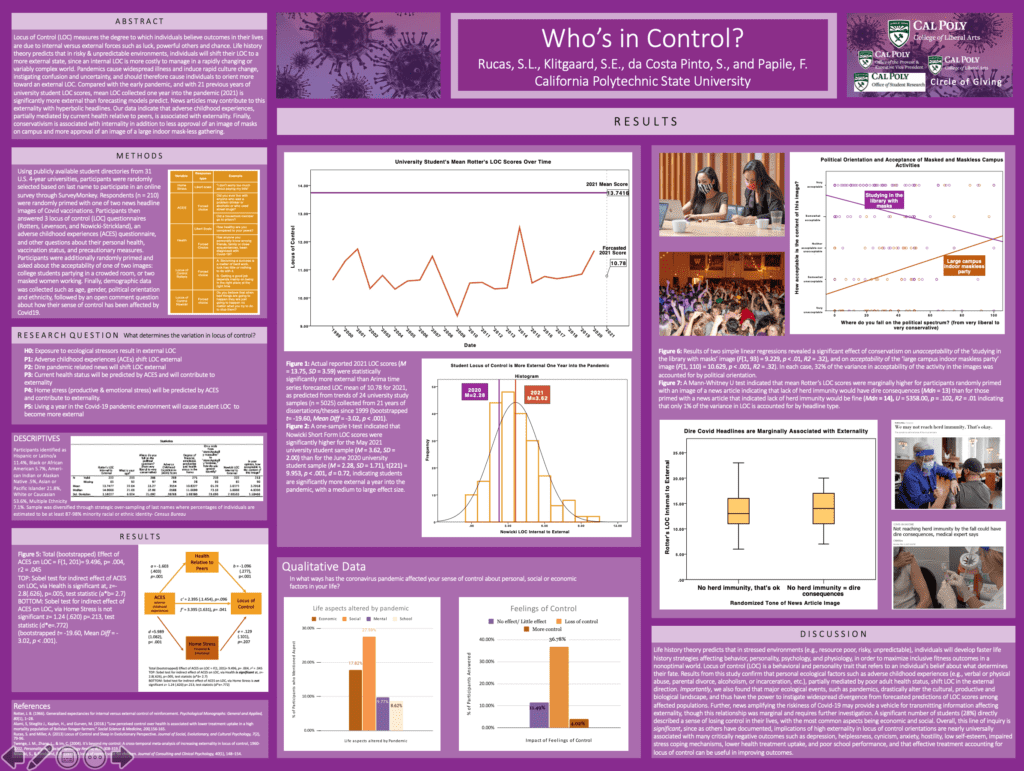Acknowledgements
We’d like to thank the Cal Poly College of Liberal Arts for providing this opportunity. We’d also like to thank the sponsors of this project- the College of Liberal Arts, the Office of Student Research, the Office of the Provost and Executive Vice President, and the Circle of Giving- for supporting undergraduate social sciences research, as well as the organizer, Dr. Dawn Niell, of the CLA SURP grants, projects, and presentations. We also want to acknowledge the students across the U.S. who took the time to participate in our study.
Human Evolutionary Ecology Lab
The Human Evolutionary Ecology (HEE) Lab is an undergraduate co-curricular lab at Cal Poly that conducts original research every academic year on the evolutionary foundations of human behavior, psychology, and culture.

Sophie Elizabeth Klitgaard
SURP recipient
Sophie is a fourth year Anthropology & Geography major who is poised for graduate studies examining the mind. She has spent her undergraduate years situating herself to study human cognition & emotion from an evolutionary and culturally relative perspective.

Dr. Stacey Rucas
Faculty Advisor
Dr. Stacey Rucas is an Anthropology professor dedicated to providing undergraduate social science students with original research experience. Her work examines sleep, female-female competition, and mating ecology from a life history perspective.

Siena Da Costa Pinto
Student Researcher
Siena is an Anthropology and Geography Major with minors in English and Media Arts, Science and Technology (MAST). She has been a devoted contributor to Behavioral Ecology research throughout college as well as creative and analytical writing projects in San Luis Obispo and on Cal Poly campus.

Fiona Papile
Student Researcher
Fiona is a recent graduate of Anthropology & Geography with a minor in Statistics. She recently accepted a position in Alaska with the US Forestry Department. During Her time at Cal Poly she participated in four faculty-student led original research projects in the HEE Lab.
Digital Poster: Who's In Control
Abstract
Locus of Control (LOC) measures the degree to which individuals believe outcomes in their lives are due to internal versus external forces such as luck, powerful others and chance. Life history theory predicts that in risky & unpredictable environments, individuals will shift their LOC to a more external state, since an internal LOC is more costly to manage in a rapidly changing or variably complex world. Pandemics cause widespread illness and induce rapid culture change, instigating confusion and uncertainty, and should therefore cause individuals to orient more toward an external LOC. Compared with the early pandemic, and with 21 previous years of university student LOC scores, mean LOC collected one year into the pandemic (2021) is significantly more external than forecasting models predict. News articles may contribute to this externality with hyperbolic headlines. Our data indicate that adverse childhood experiences, partially mediated by current health relative to peers, is associated with externality. Finally, conservativism is associated with internality in addition to less approval of an image of masks on campus and more approval of an image of a large indoor maskless gathering.
Research Questions
- H0: Exposure to ecological stressors result in external LOC
- P1: Adverse childhood experiences (ACEs) shift LOC external
- P2: Dire pandemic related news will shift LOC external
- P3: Current health status will be predicted by ACES and will contribute to externality
- P4: Home stress (productive & emotional stress) will be predicted by ACES and contribute to externality.
- P5: Living a year in the Covid-19 pandemic environment will cause student LOC to become more external
Methods
Using publicly available student directories from 31 U.S. 4-year universities, participants were randomly selected based on last name to participate in an online survey through SurveyMonkey. Respondents (n = 210) were randomly primed with one of two news headline images of Covid vaccinations. Participants then answered 3 locus of control (LOC) questionnaires (Rotters, Levenson, and Nowicki-Strickland), an adverse childhood experiences (ACES) questionnaire, and other questions about their personal health, vaccination status, and precautionary measures. Participants were additionally randomly primed and asked about the acceptability of one of two images: college students partying in a crowded room, or two masked women working. Finally, demographic data was collected such as age, gender, political orientation and ethnicity, followed by an open comment question about how their sense of control has been affected by Covid-19.
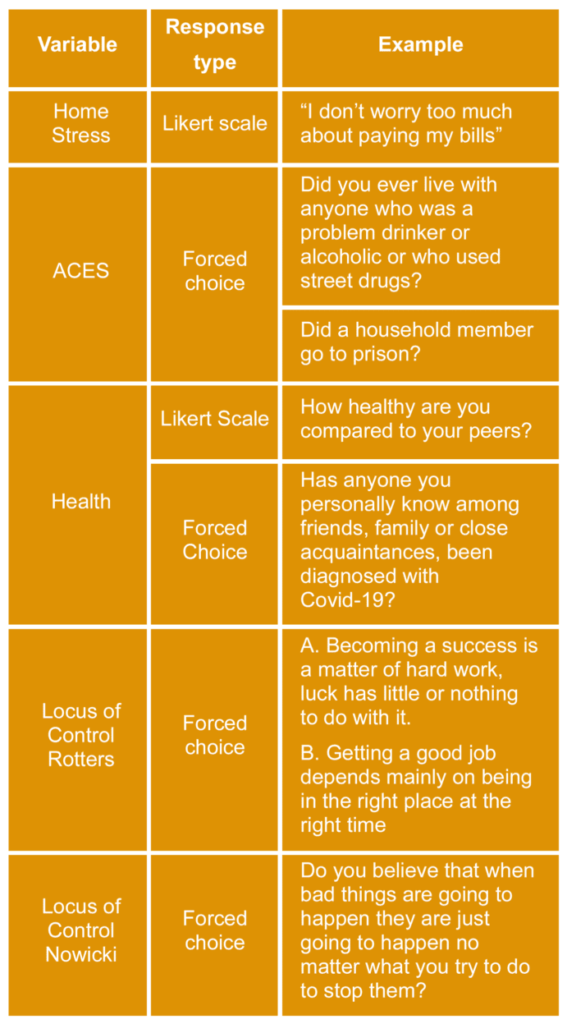
Descriptive Statistics
Participants identified as Hispanic or Latino/a 11.4%, Black or African American 5.7%, American Indian or Alaskan Native .5%, Asian or Pacific Islander 21.8%, White or Caucasian 53.6%, Multiple Ethnicity 7.1%.
Sample was diversified through strategic oversampling of last names where percentages of individuals are estimated to be at least 87-98% minority racial or ethnic identity- Census Bureau

References

Project Sponsors
- Rotter, J. B. (1966). Generalized expectancies for internal versus external control of reinforcement. Psychological Monographs: General and Applied, 80(1), 1–28. doi:10.1037/h0092976
- Alami, S, Stieglitz J., Kaplan, H., and Gurven, M. 2018. “Low perceived control over health is associated with lower treatment uptake in a high mortality population of Bolivian forager-farmers.” Social Science & Medicine, 200,156-165.
- Rucas, S. and Miller, A. (2013) Locus of Control and Sleep in Evolutionary Perspective. Journal of Social, Evolutionary, and Cultural Psychology, 7(2), 79-96.
- Twenge, J. M., Zhang, L., & Im, C. (2004). It’s beyond my control: A cross-temporal meta-analysis of increasing externality in locus of control, 1960-2002. Personality and Social Psychology Review, 8(3), 308-319.
- Nowicki, S., & Strickland, B.R. (1973). A locus of control scale for children. Journal of Consulting and Clinical Psychology, 40(1), 148–154. https://doi.org/10.1037/h0033978
Results
Students During Pandemic Are More External
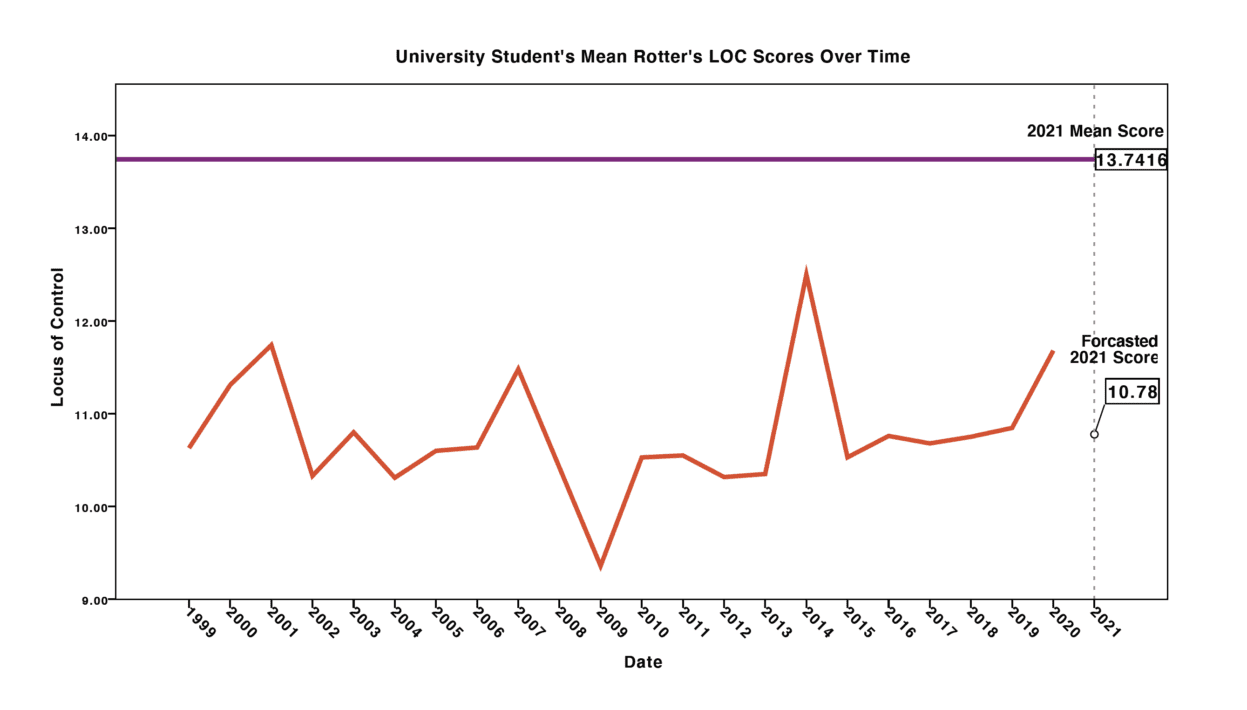
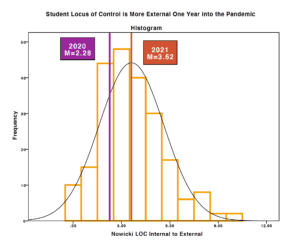
Figure 1: Actual reported 2021 LOC scores (M = 13.75, s.d. = 3.59) were statistically significantly more external than the Arima time series forecasted Locus of Control mean of 10.78 for 2021. This model was predicted from time series trends of 24 university study samples (n = 5025) collected from dissertations and theses across 21 years starting in 1999 (bootstrapped t= -19.60, Mean Diff = -3.02, p < .001).
Figure 2: A one-sample t-test indicated that Nowicki Short Form Locus of Control scores were significantly higher for the May 2021 university student sample (M = 3.62, SD = 2.00) than for the June 2020 university student sample (M = 2.28, SD = 1.71), t(221) = 9.953, p < .001, d = 0.72. This indicates that students are significantly more external in their locus of control a year into the pandemic, with a medium to large effect size.
Qualitative Data
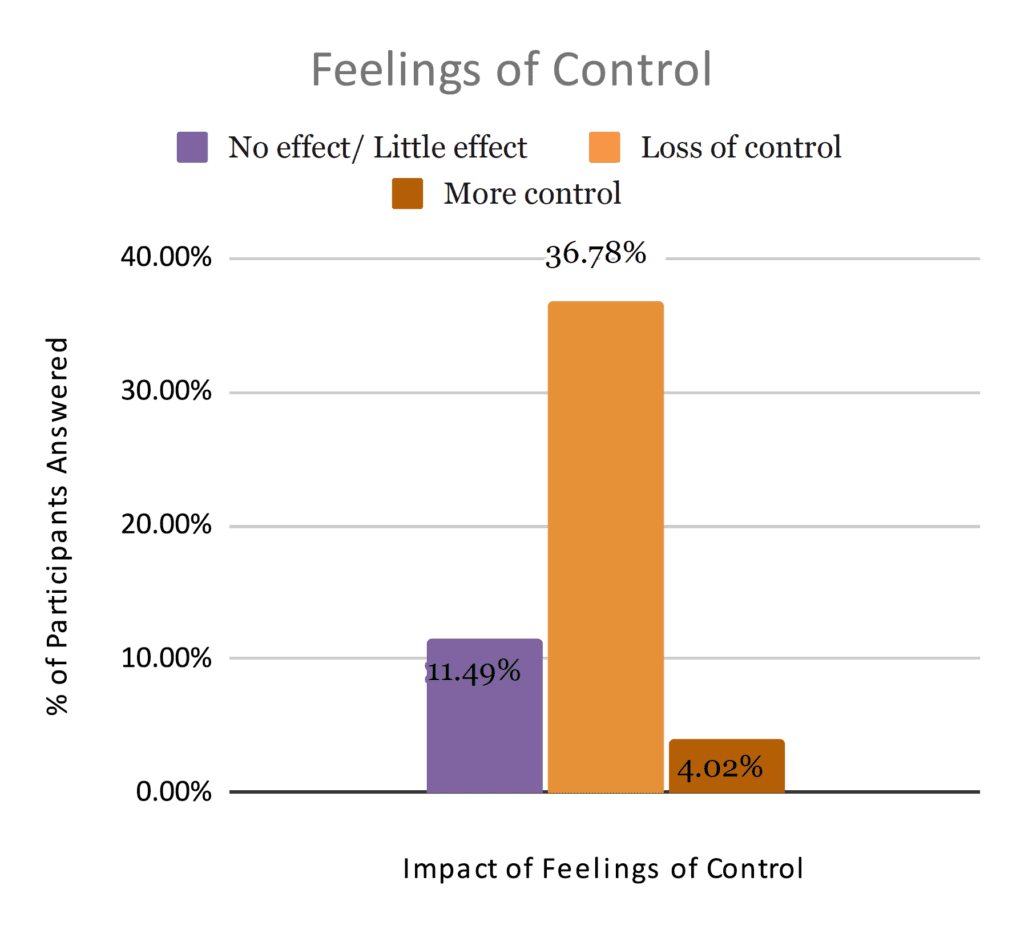
Figure 3: Responses to the question “In what ways has the coronavirus pandemic affected your sense of control about personal, social or economic factors in your life?” were coded for their content. A total of 174 participants answered the open ended question. Out of those that responded, 36.78% mentioned a loss of control experienced, 11.49% mentioned no effect or little effect on sense of control, and 4.02% mentioned more control experienced.
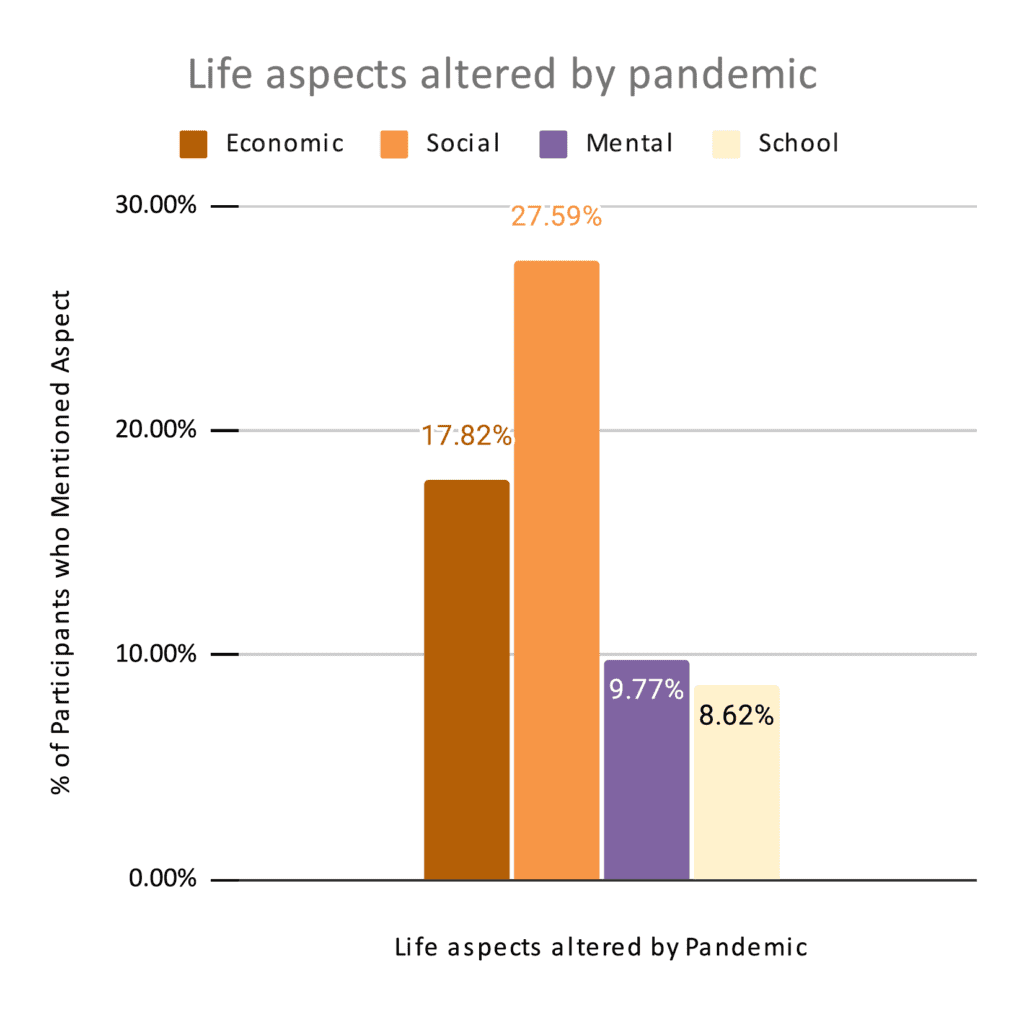
Figure 4: Responses to the question “In what ways has the coronavirus pandemic affected your sense of control about personal, social or economic factors in your life?” were coded for their content. A total of 174 participants answered the open ended question. Out of those that responded, 27.59% mentioned social aspects of life, 17.82% mentioned economic aspects of life, 9.77% mentioned mental health aspects, and 8.62% mentioned school related life aspects.
Effect of ACES, Current Health, and Home Stress on Locus of Control
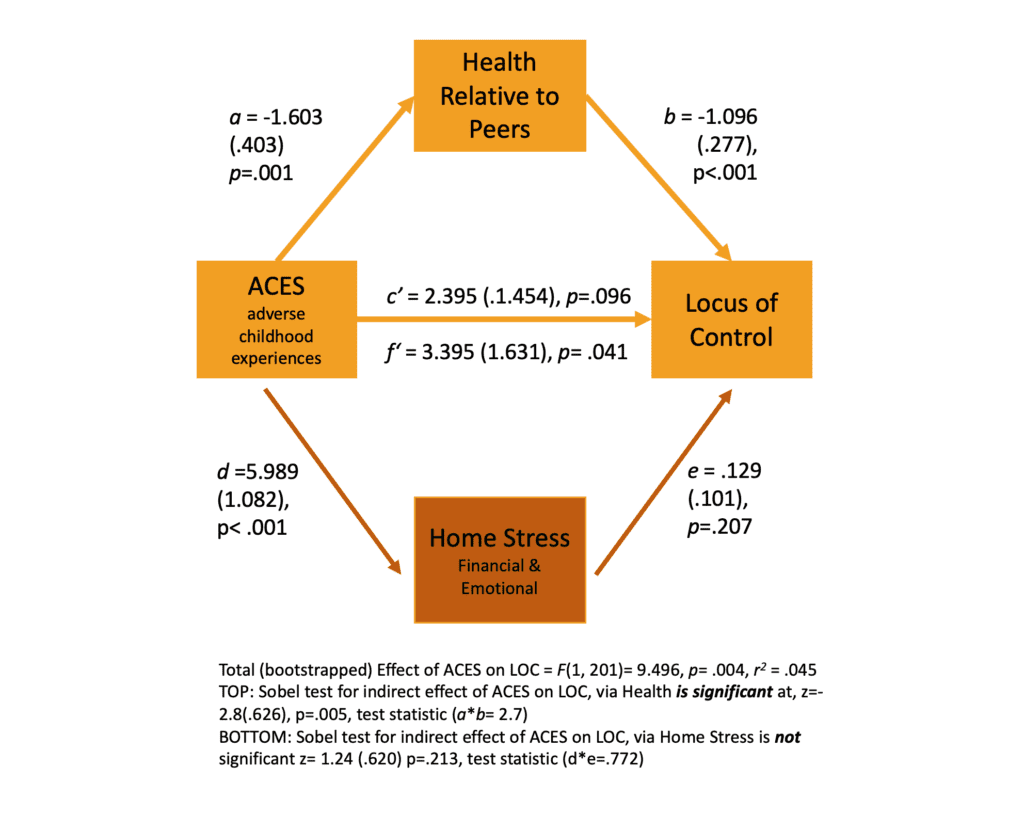
Figure 5: Total (bootstrapped) Effect of ACES on LOC = F(1, 201)= 9.496, p= .004, r2 = .045
TOP: Sobel test for indirect effect of ACES on LOC, via Health is significant at, z=-2.8(.626), p=.005, test statistic (a*b= 2.7)
BOTTOM: Sobel test for indirect effect of ACES on LOC, via Home Stress is not significant z= 1.24 (.620) p=.213, test statistic (d*e=.772) (bootstrapped t= -19.60, Mean Diff = -3.02, p < .001).
Effect of Political Orientation on Acceptability Rating

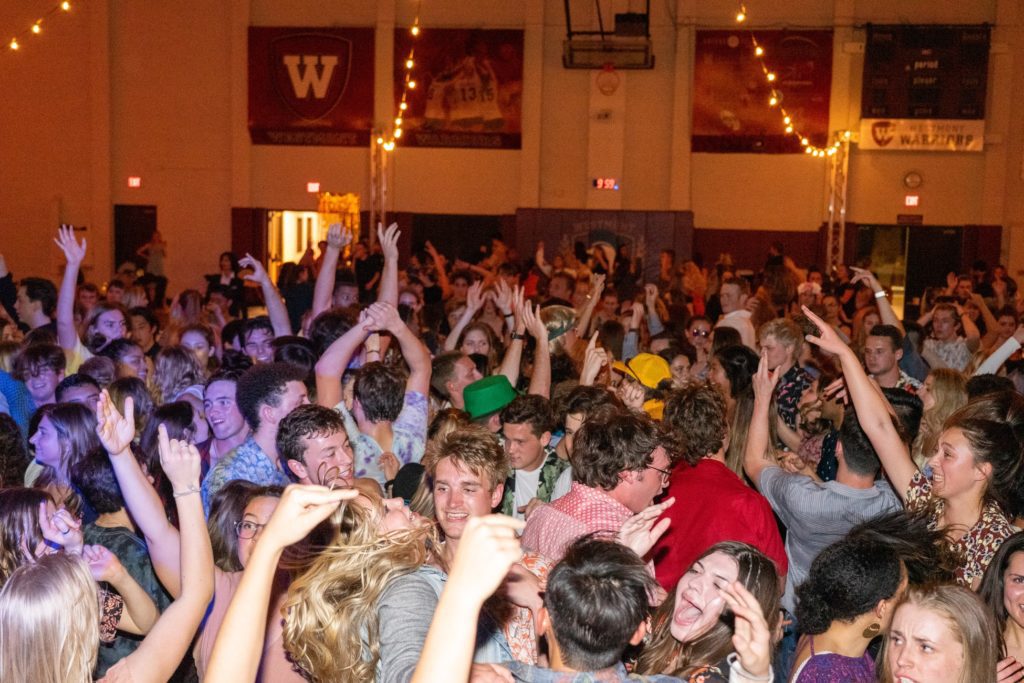
Image A: Maskless college party.
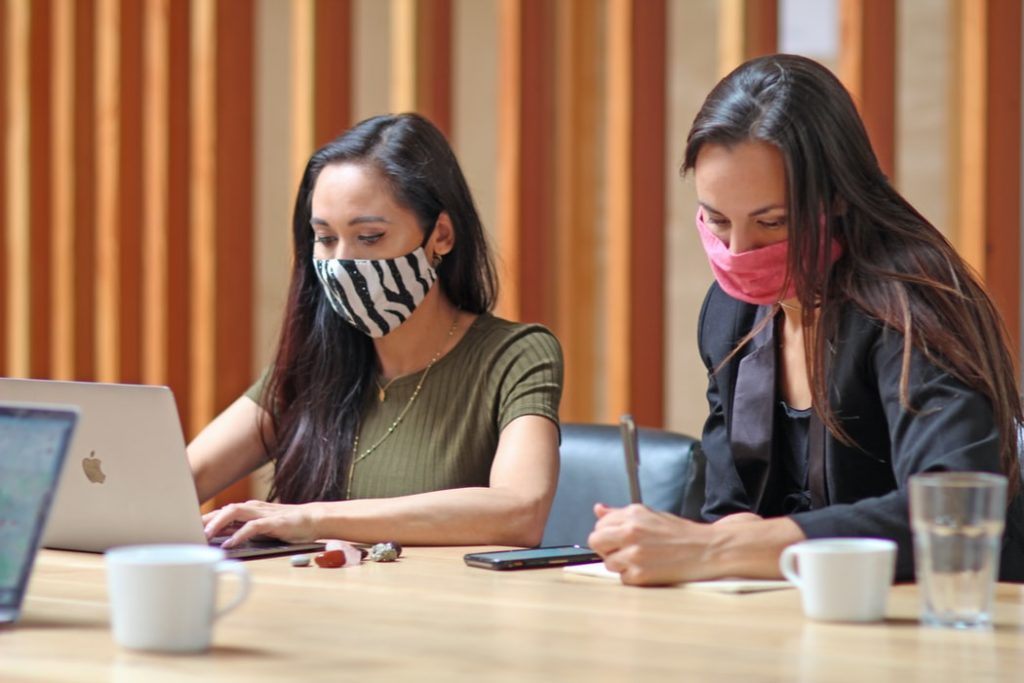
Image B: Masked students studying.
Figure 6: Results of two simple linear regressions indicated that there was a significant effect of conservatism on unacceptability of the ‘studying in the library with masks’ image (F(1, 93) = 9.229, p < .01, R2 = .32), and on acceptability of the ‘large campus indoor maskless party’ image (F(1, 110) = 10.629, p < .001, R2 = .32). In each case, 32% of the variance in acceptability of the activities displayed in the images was accounted for by political orientation.
Effect of Primer Image on Locus of Control
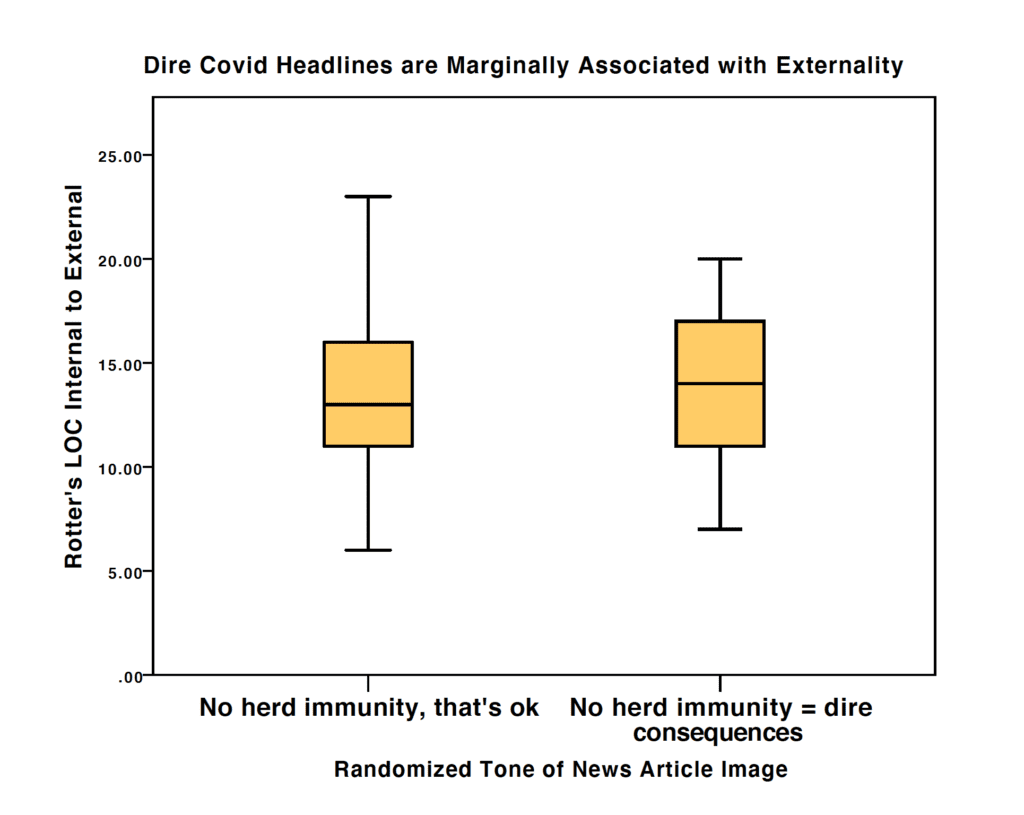
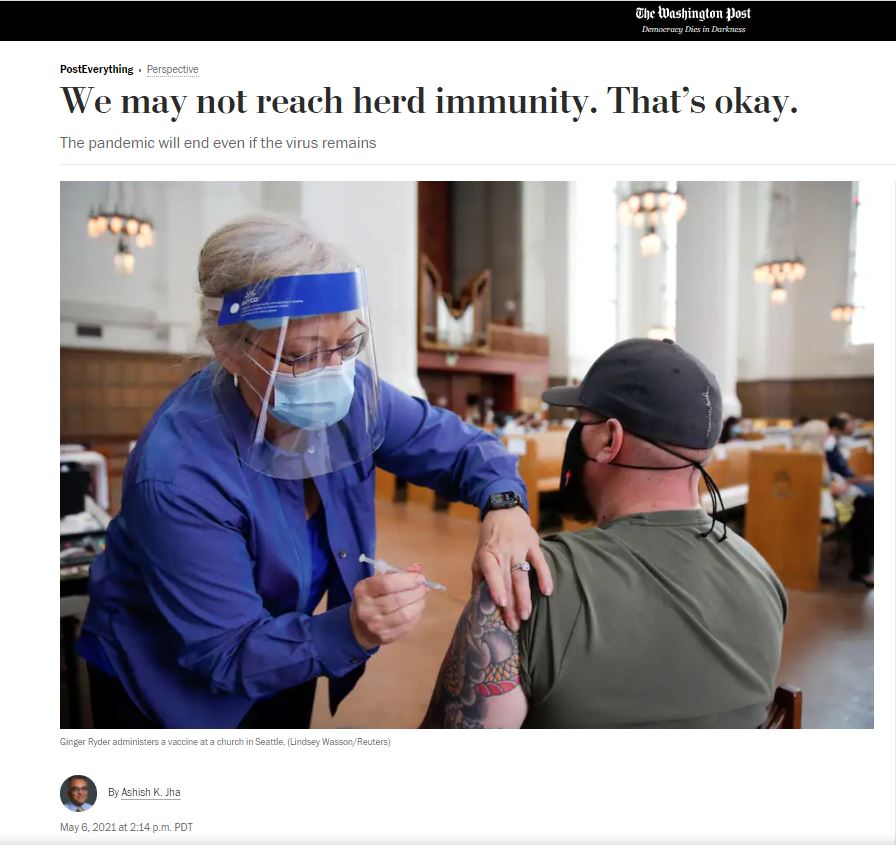
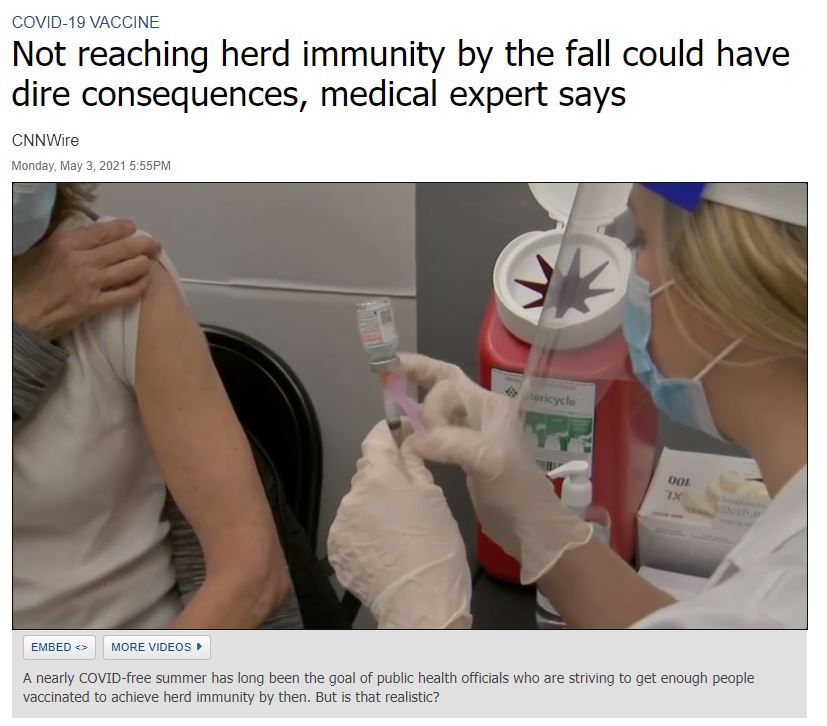
Figure 7: A Mann-Whitney test indicated that mean Rotter’s Locus of Control scores were marginally higher for participants randomly primed with the an image of a news article indicating that lack of herd immunity would have dire consequences (Mdn = 13) than for those primed with a news article that indicated lack of herd immunity would be fine (Mdn = 14), U = 5358.00, p = .102, R2 = .01 indicating that only 1% of the variance in LOC is accounted for by headline type.
Discussion
Life history theory predicts that in stressed environments (e.g., resource poor, risky, unpredictable), individuals will develop faster life history strategies affecting behavior, personality, psychology, and physiology, in order to maximize inclusive fitness outcomes in a nonoptimal world. Locus of control (LOC) is a behavioral and personality trait that refers to an individual’s belief about what determines their fate. Results from this study confirm that personal ecological factors such as adverse childhood experiences (e.g., verbal or physical abuse, parental divorce, alcoholism, or incarceration, etc.), partially mediated by poor adult health status, shift LOC in the external direction. Importantly, we also found that major ecological events, such as pandemics, drastically alter the cultural, productive and biological landscape, and thus have the power to instigate widespread divergence from forecasted predictions of LOC scores among affected populations. Further, news amplifying the riskiness of Covid-19 may provide a vehicle for transmitting information affecting externality, though this relationship was marginal and requires further investigation. A significant number of students (28%) directly described a sense of losing control in their lives, with the most common aspects being economic and social. Overall, this line of inquiry is significant, since as others have documented, implications of high externality in locus of control orientations are nearly universally associated with many critically negative outcomes such as depression, helplessness, cynicism, anxiety, hostility, low self-esteem, impaired stress coping mechanisms, lower health treatment uptake, and poor school performance, and that effective treatment accounting for locus of control can be useful in improving outcomes.

